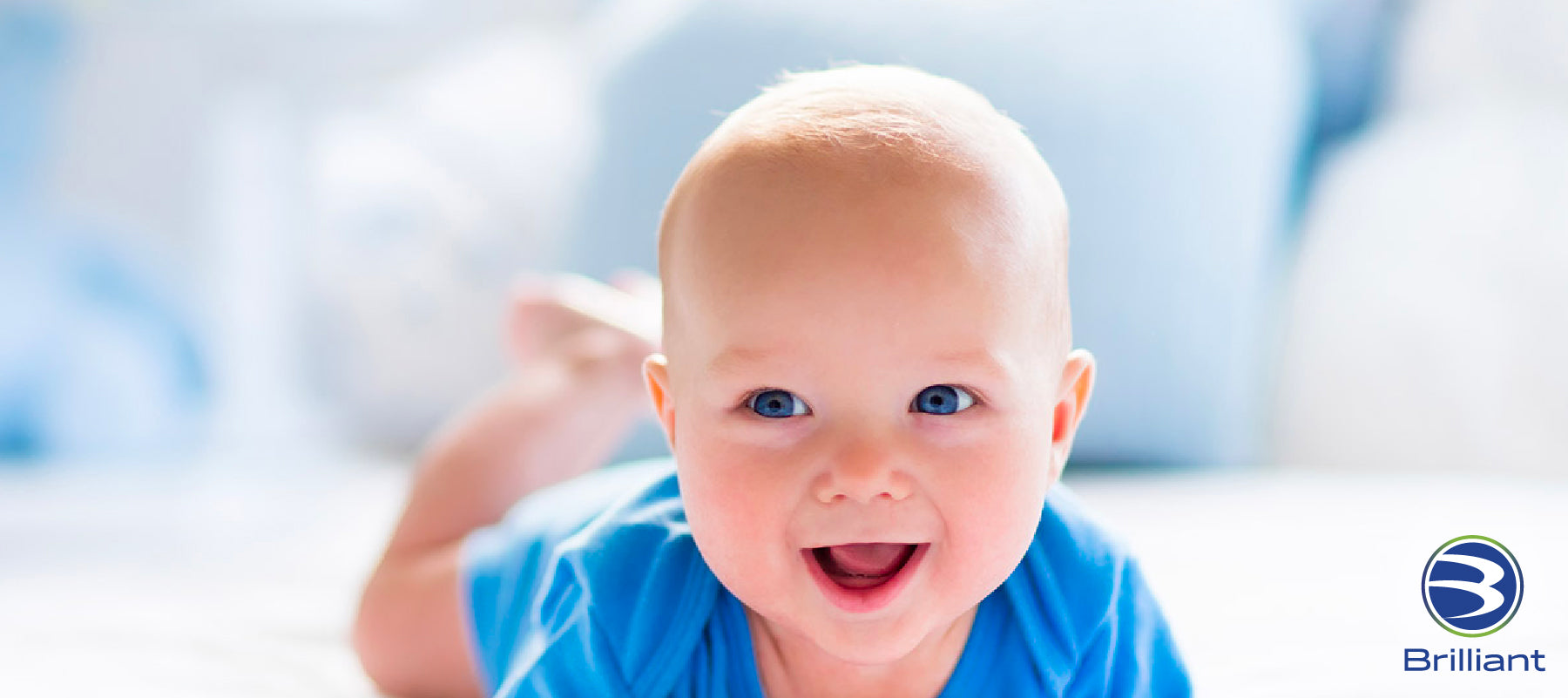- Phone: 1.404.373.4030
- Opening Hours: Mon-Fri 9AM-5PM Eastern

DISCLOSURE: Noelle Copeland RDH is the oral care specialist and dental consultant to the Brilliant and Baby Buddy oral care lines.
Oral care for infants and toddlers is just as important as oral care for adults. Today I’m going to review some of the questions I’m often asked by parents when discussing oral care recommendations for their children. It’s more than most people think and starts earlier than most people realize.
Yes! Cleaning your baby’s mouth is the first step in introducing early oral care routines that will last a lifetime. Start as soon as possible, and continue at least once a day thereafter. This routine trains a baby to accept oral care as part of a regular routine and it also trains the parent to perform this task regularly.
From the very beginning! Once a baby starts to drink breastmilk or formula, it is recommended and appropriate to start an early oral care routine. The earlier a routine is started the better. Bacteria and fungus naturally live in everyone’s mouth but the levels and ratio need to stay balanced for optimum health. Starting oral care early helps develop a lifelong routine but also keeps a more balanced oral environment. By gently wiping away residue and bacteria, you are keeping the mouth clean while supporting a healthy foundation for the future eruption of the first teeth.
Some professionals recommend cleaning a baby’s mouth after every feeding. However, this may be a stretch for most sleep-deprived parents. Start by committing to at least once a day, around the same time, and make it a part of your regular routine. You will need a sterile cloth, preferably one that is meant for this activity usually named a mouth wipe or tooth tissue, versus a common household washcloth. Next, wrap the cloth around your adult index finger and proceed to wipe the gums, tongue, and inside cheeks of your baby. That’s it!
Starting oral care early is the foundational first step. Once that has been established, protecting the oral environment is next, and that means diet and nutrition. Limit snacks in general, but when they are enjoyed, stick to fruits and vegetables and hold back on foods that are sticky, gummy, or chewy as these types tend to adhere to teeth and gums and cause a higher rate of cavities from their elevated carbohydrate and sugar contents. Regular bristle brushing should be performed on all teeth, twice a day, by an adult. Visit the dentist when the first tooth erupts or by the first birthday, whichever comes first. Implement a rule that after the nightly brushing, food and snacks are off-limits. This includes milk, so no bedtime bottle. One of the most rapid ways parents unknowingly induce tooth decay, is when they allow their children with fully erupted baby teeth, to fall asleep right after having a bedtime milk bottle.
Help prevent decay
Establish new routines
Meal Planning Tips
Celebrate special events and accomplishments with something other than “food rewards.” Instead of a sucker or candy as a reward, utilize non-food treats.
Once the first teeth erupt it’s time to start using a bristle toothbrush. Keep doing previously established oral care routines on the rest of the mouth. This includes sterile mouth wipes and silicone toothbrushes used on the gums. Implement using a bristled toothbrush on newly erupted teeth, continuing this as subsequent baby teeth erupt into the mouth. You may use fluoride-free toothpaste or a paste that has xylitol as the active anticavity ingredient. Fluoride should not be used until a child can spit correctly and this is usually not achieved until age 3. Adults should perform all the oral care for their children.
A Bristle baby toothbrush should have soft flexible bristles that are gentle enough to brush newly erupted teeth effectively. The head of the brush should be small enough to fit in a small mouth, and the handle should be comfortable for an adult to hold while using the brush on the baby’s teeth. Baby silicone toothbrushes are another great choice for teething gums before teeth fully erupt. You can use both types during an oral care routine as needed. A silicone toothbrush for teething babies assists in cleaning budding gums while a bristle toothbrush is the best for newly erupted teeth.
Brushing routines should last about 2 minutes, especially once all the baby teeth have come in. Children do tend to build up less plaque biofilm than adults. So their needs sway more to the repetition of an oral care routine and training them in the correct way to eventually perform their own oral care. Twice a day, brush their teeth for 2 minutes. To make it fun, get a colorful sand timer or find a song to sing that’s 2-3 minutes long. While you are brushing you can even allow some electronic fun by downloading a kids oral care app that keeps track of brushing frequency and timers, rewarding compliance with stickers and stars.
Adults should perform ALL oral care for children up until the age of 5. This does not mean that you cannot start brush training before then, age 3 is a good training age. When brush training, the actual cleaning is done by you first, and the practice training is done secondly by the child while you directly supervise them as they learn.
Be sure to check out the best baby finger toothbrush and the best toothbrush for kids by visiting https://brilliantoralcare.com/collections/oral-care-kits and scooping up one of our amazing NEW oral care kits. These kits come with everything you need to start a lifetime of healthy smiles. Early oral care is important! Talk to your dental professional about any challenges you may encounter or questions you may have about taking care of your child’s teeth and gums. Remember to always #BrushBrilliant
© 2021 Compac Industries. All rights reserved. This article is intended to provide an understanding of and knowledge about “oral health topics” as expressed through the perspective and experience of the author. It is not intended to be a substitute for professional advice or counsel, including the diagnosis or treatment of any condition. Always seek the advice of your dentist or another qualified healthcare provider with any questions you may have regarding a medical condition, an oral condition, illness, or treatment of any listed or nonlisted situation above. By using this site, you signify your assent to our Terms and Conditions. If you do not agree to all of these Terms and Conditions, do not use this site.
Noelle Copeland RDH is an Oral Care Specialist and Dental Consultant who provides content for Brilliant Oral Care and Baby Buddy.


DISCLOSURE: Noelle Copeland RDH is an Oral Care Specialist and Dental Consultant who provides content

DISCLOSURE: Noelle Copeland RDH is an Oral Care Specialist and Dental Consultant who provides content

We believe that all people are fearfully and wonderfully made and designed in the womb for a grand purpose.
Useful Links
Copyright © 2023 Compac Industries | All Rights Reserved.